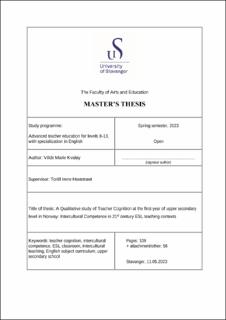| dc.description.abstract | The present study aimed to investigate teachers’ cognition and practices in relation to culture and intercultural competence (IC) teaching in English as a Second Language (ESL) classrooms at general studies in the first year of upper secondary level in Norway. Furthermore, it aimed to explore how the participant teachers interpret concepts related to IC in the newly developed Knowledge Promotion 2020 English subject curriculum (LK20) and to what extent the teachers’ beliefs and practices reflect renewed or former theoretical traditions of IC. Finally, the study simultaneously investigated the relationship between the teachers’ beliefs and practices. To collect the research data, qualitative research methods were employed. These consisted of two pre-and post-observation semi-structured interviews and five forty-five minutes classroom lesson observations per participant teacher. Three ESL teachers at general studies Vg1 level from two different schools were thus interviewed and observed.The following research questions have been addressed: What beliefs and practices do ESL upper secondary teachers have about their culture and intercultural competence teaching? How do they interpret the concept of intercultural competence in the Knowledge Promotion 2020 English Subject Curriculum? To what extent do their beliefs and practices reflect former or renewed theoretical traditions of intercultural competence? What is the relationship between the teachers’ cognition and practices?
The current study focused on and took into consideration how there exists various and contradicting opinions in literature and from scholars in how to define and teach the concept of culture and IC (Bland, 2022; Byram, 2021; Dervin, 2010, 2016, 2020; Dervin et al., 2020; Fenner, 2000; Hoff, 2016, 2019, 2020a, 2020b; Holliday, 2011; Matsuo 2012; Ros i Solé, 2013). Additionally, the English subject curriculum (LK20) in Norway does not mention any specific information about how to conduct culture and IC teaching (Hoff, 2020a; Speitz, 2020). The current study thus attempted to provide an insight into teachers’ beliefs and practices about culture and IC teaching as a result of how central the terms have become in the present curriculum, academic discussion and educational practices.
The main findings concerning the teachers’ beliefs and practices about culture and IC teaching revealed that they have not been influenced from own prior teacher education, but rather from own personal experiences in foreign countercultures from living abroad, and external factors such as classroom environment and their textbook. Additionally, the teachers believe and reflect that their teaching practices involve dominant and sub-cultures within English-speaking countries, and that this is because of their textbook’s layout. However, the findings revealed that the teachers believe culture and IC are more complex concepts than what the national approaches in their textbook suggest. These findings advocate how the teachers are inspired by their textbook, and that this external factor might influence why they do not incorporate their internal beliefs about culture and IC as wider phenomena in their lessons.
In relation to the teaching methods and materials in their culture and IC teaching, the teachers believe in and practice the use of facts combined with fiction, multimodality, oral communicative discussion, opportunity to consider and compare the perspective of what the present study refers to as the “Self” versus “Others” and the ability to personally connect. Regarding the notion of “Self” versus “Other”, the teachers seemed to not comment as much on how cultural “issues” could be discussed in own contexts, but rather from, and in comparison, to own and other perspectives. Moreover, the teachers frequently deal with culture and IC in their lessons, not as solo subjects in fixed instances, but rather something that is present in most of their teaching situations alongside other themes.
The study showed that the teachers interpret the concept of IC in the English subject curriculum (LK20, 2019) as open and vague, but that they have positive attitudes towards it. Concerning IC in the interdisciplinary topic “Health and life skills”, the teachers interpret it cohesively in how it can be beneficial to learn to navigate between yourself and other people that may be more or less different. Moreover, in relation to IC in the interdisciplinary topic “Democracy and Citizenship”, they connect it to the understanding of the perspective of living in a democratic country.
Concerning to what extent the teachers’ beliefs and practices reflect former or renewed theoretical traditions of IC, the findings indicated that the teachers’ beliefs and practices cannot solely be placed within one of these traditions, as they seem to move in and out of them depending on what contexts they discuss or are in. The main findings the present study can connect to these traditions are how the teachers view culture and IC as more complex than their textbook’s national approach, however they are inspired by these national approaches in their lessons, that they bring up conflictual dimensions and controversial issues to different extents, mostly employ “Western” derived perspectives and believe IC can be assessed.
The present study contributes to research within the field of culture and intercultural teaching and supports the discourses of studies on renewed IC teaching, teachers’ cognition about IC in relation to the current English subject curriculum (LK20, 2019) and the relationship between teachers’ cognition and practices in Norwegian ESL classroom contexts. By focusing on teachers’ cognition and practices in relation to the newly developed curriculum (LK20, 2019), the CoE and present academic discussions concerned with the subject of IC in education, the thesis draws attention to the need for a clearer understanding of how IC teaching is and should be conducted in the ESL classroom. Moreover, it suggests a more developed response from curriculum developers on what IC means and refers to in the present Norwegian curriculum (LK20, 2019). | |
